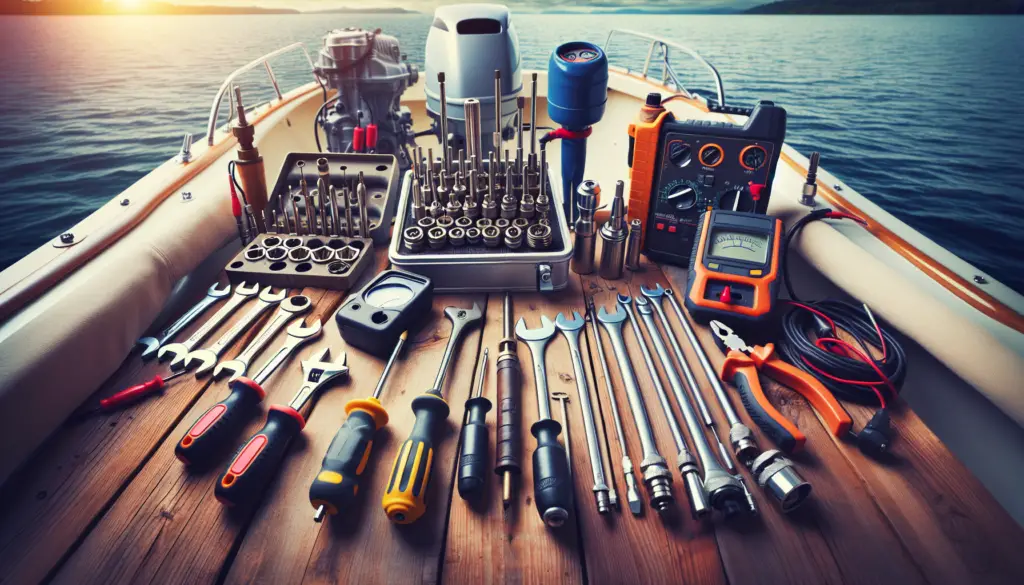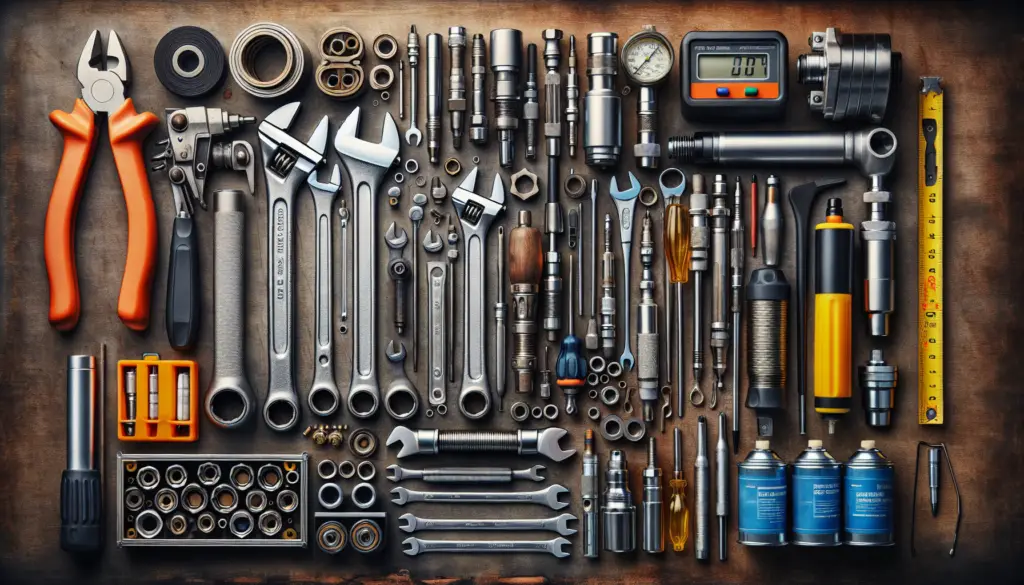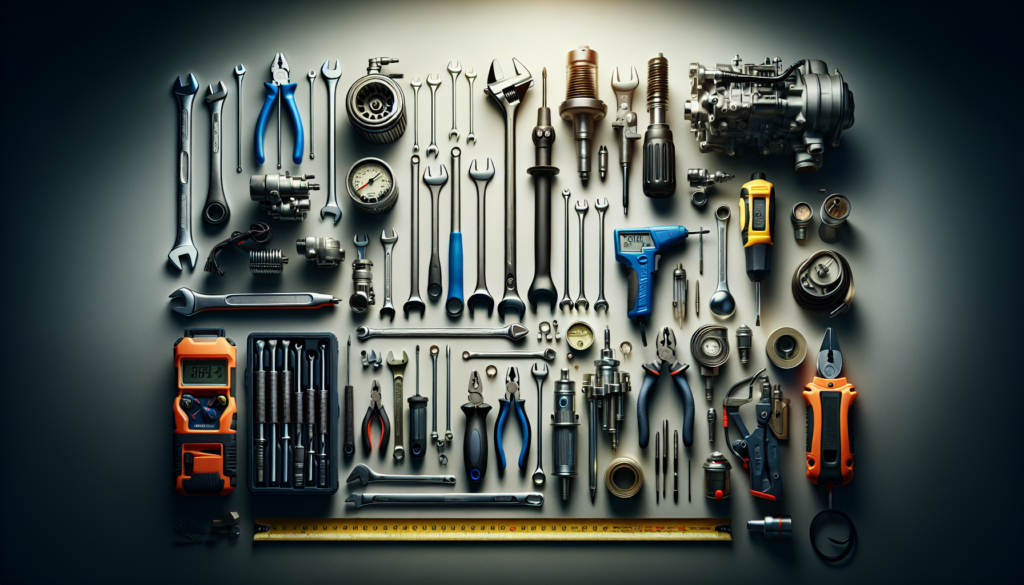As a proud boat owner, you appreciate the freedom that comes with cruising the open water. But with this enjoyment comes the inevitable need for maintenance and repairs. Your guide, “Must-Have Boat Engine Tools for DIY Maintenance and Repairs” is a must-read for any boat owner who wants to take control of their vessel’s upkeeping. By using this straightforward guide, you’ll explore the essential tools for DIY boat maintenance and learn the importance of each, making the often daunting task of boat repair approachable. So, sit back, relax, and prepare to take your boat’s health into your own hands.

Understanding Boat Engine Mechanics
Understanding the mechanics of your boat’s engine is vital to ensure its proper function and longevity. If you’re using your boat regularly, knowing how the engine works and how to keep it healthy is a must. And hey, it’s doable even if you’re not a certified marine mechanic.
Importance of Boat Engine Mechanics
By comprehending boat engine mechanics, you’re not only saving money on costly repairs but also guaranteeing a safe expedition every time you hit the water. Learning about the engine can help you foresee an impending problem and take preventative measures. The last thing you want is an engine cut out in the middle of the sea!
Understanding Basic Boat Engine Components
Boat engines might seem overwhelming, but once you understand the basic components – such as the carburetor, spark plug, filters, belts, and coolant system – things become a lot easier. Remember the car engine in your garage? Yeah, boat engines work on similar principles. Knowing about these components and their function is your first step to mastering boat engine mechanics.
Safety Measures in Doing DIY Boat Engine Maintenance and Repairs
Safety always comes first! Always wear the right safety gear, including gloves and safety glasses. Keep a fire extinguisher nearby, just in case. Never forget to disconnect the battery before starting any maintenance or repair. And finally, always operate in a well-ventilated area, away from flammable liquids and vapors.
Essential Boat Engine Tools
The road to DIY boat engine maintenance starts with arming yourself with the right set of tools. It’s less about having expensive tools and more about the right ones.
Comprehensive List of Essential Boat Engine Tools
The must-have boat engine tools include hand tools such as wrenches, screwdrivers, and pliers for basic maintenance tasks; spark plug wrench, feeler gauges, and compression tester for precise tasks; and cleaning tools like wire brushes and degreasers to keep the engine clean. Diagnostic tools like multimeters and pressure gauges can help you identify issues early on.
Explanation on The Function Of Each Tool
Wrenches, screwdrivers, and pliers are used for numerous tasks, such as tightening or loosening bolts, adjusting parts, or replacing components. Spark plug wrenches, as the name suggests, are ideal for removing and installing spark plugs. Feeler gauges are used for setting the correct gap on spark plugs. Compression testers help you diagnose engine problems by checking the cylinder compression. Cleaning and diagnostic tools, meanwhile, come in handy for regular engine upkeep and troubleshooting.
Where to Buy These Essential Boat Engine Tools
These tools are widely available at any well-stocked hardware or auto parts store. You could also find them online on e-commerce websites such as Amazon or specialized marine supply stores.

Tool Set for General Maintenance
Some tools are more frequently used than others. Wrenches, screwdrivers, pliers, and the duct tape- they’re the grease monkeys’ best friend.
Wrench Set
Wrenches are utility tools for your boat. Whether it’s tightening a bolt or loosening one, your wrench set is the go-to tool.
Screwdrivers
Screwdrivers are essential for removing or installing a multitude of components in the engine. Make sure you’ve got all sorts – flat head, Phillips, Torx, etc.
Pliers
Pliers, especially adjustable ones, are like your third hand. They can hold, twist, pull, or tighten where your hand can’t reach.
Duct Tape
Duct tape, your handy, do-it-all fixer, might seem odd in this list. But boat owners acknowledge its importance; it’s good for a quick leak fix until you get a proper repair done!
Specialty Tools for Boat Engine Maintenance and Repairs
Getting more deep into the mechanic game, we come across some specialty tools that help with more specific tasks.
Spark Plug Wrench
Your tiny friend, the spark plug, might need accurate force to loosen or tighten, and that’s where a spark plug wrench comes in.
Feeler Gauges
Feeler gauges are thin strips used to measure the gap between two components, such as spark plug electrodes.
Compression Tester
Compression testers reveal the health of your engine’s cylinders, a vital sign you don’t want to miss.
Carburetor Synchronizer
And if your boat has multiple carbs, a carburetor synchronizer will help you tune them in harmony for the smooth running of the engine.

Cleaning Tools for Boat Engines
While focusing on the mechanics, don’t miss out on cleaning. An engine cleanse is not just about aesthetics. Regular cleaning protects your engine parts from wear and tear, rust, and corrosion.
Wire Brushes
Wire brushes are perfect for scrubbing off rust or caked-on grease from engine parts.
Degreaser
A degreaser is essential to remove all the grime that may have accumulated on your engine parts.
Rags and Absorbent Mats
Don’t underestimate these humble tools. They’re handy for wiping down parts and soaking up spills – making your work area cleaner, safer, and more efficient.
Boat Engine Diagnostic Tools
Modern diagnostic tools are like tiny doctors for your engine. They read vital signs and help you catch potential issues before they turn into expensive repair jobs.
Multimeters
Multimeters measure multiple electrical properties, including voltage and resistance, which can help diagnose electrical issues in your engine.
Pressure Gauges
Pressure gauges assess the oil pressure, fuel pressure, and coolant pressure in your engine – all vital signs for your engine’s health.
Temperature Gun
Excessive heat can damage your engine. A temperature gun lets you check the temperature of various engine parts with a simple point and click.
Engine Hour Meter
An engine hour meter records the number of hours your engine has been running. This helps you keep track of maintenance schedule: oil changes, filter replacements, etc.

Tool Kit Organization and Storage
Now that you’ve got your tools, let’s talk about storing and organizing them the right way.
Tool Box Considerations
Choosing the right toolbox is as important as the tools themselves. Consider factors like capacity, portability, durability, and compartments for organization.
Importance of Organizing Your Tool Kit
A well-organized tool kit saves time. You won’t be scrambling to find tools amid a repair. It also helps you keep track of your tools, making sure none go missing or get misplaced.
Keeping Your Tools in Good Condition
Remember to clean your tools after every use and store them in clean, dry place. This helps avoid rust and ensures they are always ready to use when needed.
Basic Boat Engine Maintenance Techniques
Regular maintenance is key to a healthy boat engine. It can be as basic as changing oil and filters, cleaning spark plugs, inspecting belts and hoses, and checking coolant levels.
These are simple tasks that anyone can learn to do with a little practice. Not only do they keep your engine running smoothly but they also prolong the life of your engine’s components.
Changing Oil and Filters
Oil lubricates various parts of your engine, reducing friction and preventing overheat. Regular changing of the oil and filters is key to ensuring the engine runs smoothly.
Cleaning and Replacing Spark Plugs
Spark plugs are pivotal for your engine’s ignition. Keeping them clean and replacing when necessary is an integral part of engine maintenance.
Inspecting Belts and Hoses
Belts and hoses are like the veins and arteries of your boat’s engine. Regular inspection can prevent unexpected engine failures caused by wear and tear.
Checking and Maintaining Coolant Levels
Your coolant system is the engine’s cooling agent, preventing it from overheating. Regular checks and maintaining adequate coolant levels can save you from expensive repairs.
Common DIY Boat Engine Repairs
Fear not, some common issues can be easily fixed through DIY repairs. Replacing worn-out belts, fixing leaks, and replacing faulty spark plugs are within your reach. Overheating issues? You could handle those too once you understand the regular cooling system checks and maintenance.
Replacing Worn Out Belts
Belts drive the engine’s accessories such as the water pump, alternator, air conditioning compressor, etc. If worn out, changing ‘em is a straightforward task.
Fixing Leaks
Leaks can be due to faulty gaskets or seals or might be an indication of a more significant problem. Identifying and fixing them early can save your entire engine system.
Replacing Faulty Spark Plugs
A faulty spark plug can impact the engine’s performance or even prevent it from starting. Knowing how to replace them can save you from a lot of engine troubles.
Dealing with Overheat Issues
To deal with overheating issues, you need to know your coolant system well. Regularly check the coolant levels, look for leaks, and maintain the coolant pump in good condition.
When to Seek Professional Help
There’s something empowering about fixing your boat engine, but do remember that not everything can or should be handled by yourself. There are limits to DIY.
Identifying Maintenance And Repair Tasks Beyond Your Skill Level
Don’t bite more than you can chew. Intricate tasks such as engine timing or rebuilding the carburetor should be left to the professionals. You wouldn’t want to jeopardize the entire engine trying to be adventurous!
Finding Reliable Professionals For Boat Engine Maintenance And Repair
Finding a trustworthy professional is crucial. Ask for recommendations from other boat owners or check online for reviews before choosing a service.
Cost Considerations For Professional Services
While DIY certainly saves money, at times, you must not compromise safety for cost. Keep a budget aside for professional checks and maintenance regularly. It’s all part of owning a boat!
And there you have it. Owning a boat is not just about breathtaking sunsets on the horizon; it’s also about ensuring that the engine propelling you towards those sunsets works efficiently! Happy boating!

